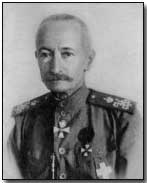Who's Who - Alexei Brusilov
 In addition to being one of the great
innovative commanders of the war, Alexei Alekseevich Brusilov (1853-1926)
was one of relatively few commanders to flourish during both Romanov and Bolshevik
periods.
In addition to being one of the great
innovative commanders of the war, Alexei Alekseevich Brusilov (1853-1926)
was one of relatively few commanders to flourish during both Romanov and Bolshevik
periods.
Born in Tiflis the son of an aristocrat, Brusilov was educated in the Imperial Corps of Pages before beginning his military career as a cavalry officer in the Caucasus. Brusilov served with distinction during the Russo-Turkish War of 1877-78; and in 1906 was promoted General.
With the onset of war in August 1914 Brusilov was handed command of the Russian Eighth Army in Galicia (having barely managed to return from a July holiday in Germany).
Notwithstanding his experience with the cavalry Brusilov quickly came to appreciate the value that modern artillery, including machine gunnery, brought to the modern battlefield.
Brusilov's offensives were marked by a devotion to minute planning, with every possible detail considered, whilst retaining a tactical flexibility should (as so often happened) events take an unexpected turn. Brusilov quickly established Eighth Army as the most consistently successful in the Russian army.
Following early successes in 1915 (one of few men to achieve anything in the early barren Russian years, and having emerged with credibility intact from the 1915 'Black-Yellow' Offensive) Brusilov was given command of the South-west Army Group in place of Nikolai Ivanov in March 1916.
Later that spring saw the launch of the Brusilov Offensive in the east, devised following pressure from Italy. The offensive enabled Brusilov to put into broad practice the lessons learnt during earlier successful (and disastrous) Russian experiences. Never one to put a failure down to supply shortage, unlike many other Russian commanders, Brusilov chose instead to believe that such reverses largely stemmed from operational shortcomings.
Thus the Brusilov Offensive saw the implementation of numerous tactics that later became a staple of the Red Army: deception, surprise and momentum; a marked contrast from the usual breakthrough methods invariably employed on the Western Front. Details of his attacking formations were closely guarded, and he made extensive use of tightly coordinated artillery bombardments directed from the air by radio.
The Brusilov Offensive began on 4 June 1916 in spectacular fashion, demolishing the Austrian Fourth and Seventh Armies. The Austrians lost a staggering 1.5 million men (including 400,000 taken prisoner) and ceded some 25,000 square kilometres of ground.
With the launch of the Brusilov Offensive any hopes the Austrians harboured of bringing about victory in the east were extinguished. Austrian attacks in Italy ceased; and Romania finally entered the war with the Allies.
But for the failure of Alexei Evert to join the attack against German forces in the north (as planned), the overall success of the Brusilov Offensive would probably have been assured. As it was the Offensive gummed up in Brusilov's need to save the Allies' latest ally - Romania - from a German invasion.
With the onset of revolution in Russia in 1917, Brusilov argued for the Tsar's abdication; the subsequent Provisional Government promptly appointed Brusilov Commander-in-Chief of the Russian army in July, shortly after Brusilov had been asked to resign by his predecessor General Mikhail Alexeev.
As Commander-in-Chief Brusilov personally led the Russian Seventh and Eleventh Armies in the final Russian attack on the Eastern Front, the Kerenski Offensive of 1 July 1917 - sometimes referred to as the Second Brusilov Offensive and comprising the 31 divisions of the Red Army for the first time.
Despite a fine start - 10,000 prisoners were taken on the first day alone - poor morale, supply difficulties and the arrival of German reserves quickly slowed progress until, in mid-July, the attack was effectively called off.
In the wake of the offensive Brusilov suffered a setback when, on 1 August, he was replaced as Commander-in-Chief by General Lavr Kornilov. Launched in the face of popular protest, the Kerenski Offensive (planned by Alexander Kerenski and Brusilov) had finally broken the cohesion of the Russian Army.
With the subsequent Bolshevik ascent to power, Brusilov waited until 1920 to offer his services. He consequently led the Red Army to Warsaw in 1920, but largely retained staff positions, initially as a military consultant and then as an inspector of cavalry until 1924, when he retired.
Alexei Brusilov died on 17 March 1926 in Moscow. His war memoirs were subsequently translated into English and published in 1930 as A Soldier's Notebook, 1914-1918.
Click here to read Brusilov's official statement issued during the initial success of the Brusilov Offensive. Click here to read Brusilov's call to arms in launching the Kerenski Offensive. Click here to read Brusilov's reports regarding the progress of the Kerenski.
Prevalent dysentery among Allied soldiers in Gallipoli came to be referred to as "the Gallipoli gallop".
- Did you know?
